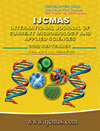


 National Academy of Agricultural Sciences (NAAS)
National Academy of Agricultural Sciences (NAAS)

|
PRINT ISSN : 2319-7692
Online ISSN : 2319-7706 Issues : 12 per year Publisher : Excellent Publishers Email : editorijcmas@gmail.com / submit@ijcmas.com Editor-in-chief: Dr.M.Prakash Index Copernicus ICV 2018: 95.39 NAAS RATING 2020: 5.38 |
Ever since the early days of space exploration and research, studies related to the survival of life in the outer space has gained much of momentum. As time passed, the advancements in the technology have given us the ability to develop advanced facilities to study and dive deeper into the responses of microorganisms to the stress conditions existing in the space. After the Theory of Panspermia was proposed by Swedish scientist Svante Arrhenius and later by Sir Fred Hoyle, it’s been almost half a century that the research related to microbial behavior in space has begun and is still continuing. The International Space station has been the regular site which functions as the observatory for understanding the effects of space related factors such as Microgravity, Radiation, Vacuum etc. on microorganisms. Their adaptability and survival have always been the keen area of interest along with to identify the mechanisms carried out by predominant species in these extreme conditions. These adaptations can be either useful or be dangerous for both the spacecrafts as well as the crew members onboard. Therefore, it is necessary to monitor and study how the conditions like radiation and microgravity could influence the microorganisms. Advanced techniques in -omics studies have helped in genomic level research of microorganisms exposed to space conditions. Addressing these microbial alterations will help in designing the counter measures to their damaging effects and allow us to utilize their properties that are potentially useful. Various processes are hence being studied in both in situ and ex situ environments. In this review we will also discuss how these researches would be stepping stones for sustenance in the future longer manned space missions to Mars and beyond.
 |
 |
 |
 |
 |